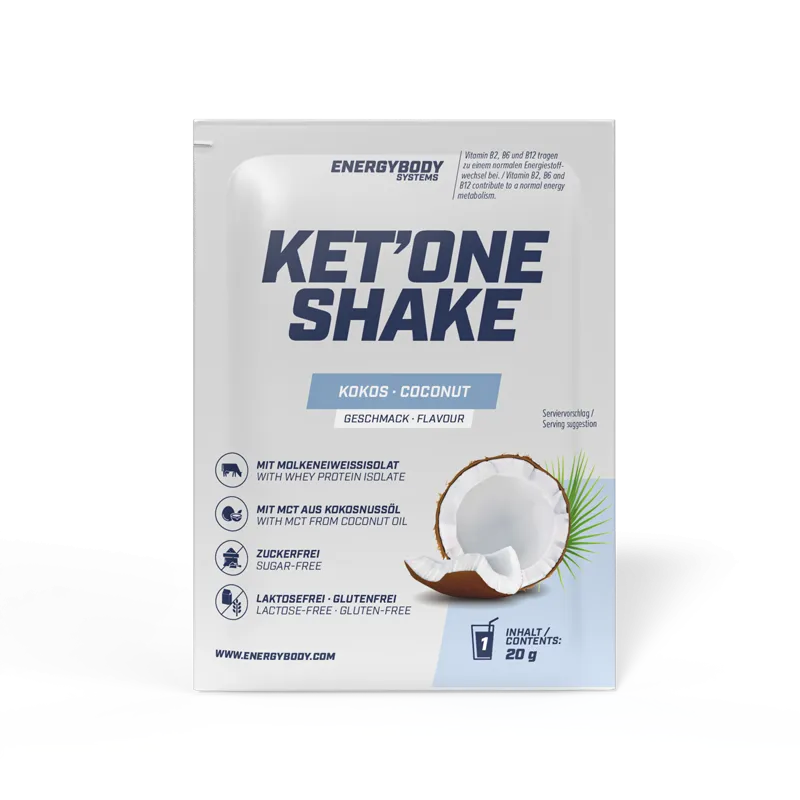Keto
Achieve your dream body and maximum performance with keto
The ketogenic diet - or keto for short - is a form of nutrition that is mentioned time and again in a wide variety of contexts: Keto diet for fat loss. Keto diet for better concentration. Keto diet for more stamina. The term keto even crops up again and again in connection with various illnesses. But what is it really all about? We explain this special form of nutrition and how you can perhaps benefit from a ketogenic diet yourself.
What is keto?
Before we get into the details, we first need to consider what keto actually is. Basically: nothing new. Most people are familiar with a ketogenic diet in connection with the term Atkins diet. This is because it was the physician Dr. Atkins who popularized this form of nutrition.
The main characteristic of a ketogenic diet is the low carbohydrate content of the diet, combined with a lot of fat. Up to 75% of the daily calories in a ketogenic diet come from foods that ideally have a high proportion of healthy fats. The proportion of carbohydrates, on the other hand, should ideally not exceed 25 g per day. This makes the ketogenic diet a special low-carb form and is sometimes even called a no-carb diet.
Foods such as rice, pasta, bread, potatoes or muesli are taboo on the ketogenic diet. The small amount of carbohydrates allowed in a ketogenic diet should come from low-starch and high-fiber vegetables. Broccoli, cauliflower, kale, salads and cucumbers are examples of foods that are suitable for a keto diet.
The ketogenic diet is complemented by recipes that contain high-quality proteins. Here, too, you should choose foods that contain hardly any carbohydrates - for example eggs, fatty meat, fatty sea fish and full-fat dairy products.
If you've never heard of the ketogenic diet before, you'll probably be scratching your head. This is because these recommendations are practically the exact opposite of the official dietary recommendations as you know them. So what is this unusual form of diet supposed to do for the body?
What makes the ketogenic diet so special?
To understand this, we need to look a little deeper into our bodies. The ketogenic diet is so called because this type of diet produces ketone bodies (also known as keto bodies). In simple terms, these are substitute carbohydrates. Although almost every tissue in our body can obtain its energy from fats, there are some cell types that are dependent on a supply of carbohydrates. These include red blood cells and certain nerve cells. If we deprive our body of carbohydrates by eating low-carbohydrate foods, it begins to produce ketone bodies. And these in turn can also be used by the tissues mentioned.
It gets really interesting when we look at our brain. Our brain cells are also unable to use fats as an energy source. Or rather: the fats don't even get through to our brain. Keto bodies do. And if we provide our brain with a mix of carbohydrates and keto bodies, it uses the keto bodies more, generates more energy from them and processes them \"cleaner\" in the metabolism than carbohydrates. This means, for example, that fewer free radicals are formed. These are intermediate metabolic products that accelerate ageing processes and trigger diseases such as type 2 diabetes or cardiovascular diseases.
Keto is therefore a kind of brain food, so to speak. Once the brain has become accustomed to using mainly ketone bodies to provide energy, most users of a keto diet report an increased ability to concentrate and delayed fatigue in the cognitive area. So if you are mentally challenged in everyday life or often have to concentrate for long periods, keto could be a really valuable alternative diet for you.
Why high-fat and low-carb in the ketogenic diet?
Ketone bodies are formed in our liver. However, this only happens when there are no carbohydrates available and the fat metabolism is running at full speed. And this is exactly what happens when we reduce the carbohydrates in our diet to a minimum and rely on high-fat foods for energy instead. If we eat too many carbohydrates, we do not enter a state of ketosis (the state at which a certain concentration of ketone bodies in the blood is exceeded). However, this is precisely the aim of the keto diet.
A regular criticism of the ketogenic diet is that too many ketone bodies in the blood can even be fatal. And that is true. However, this only applies to diabetics who already have a severe metabolic disorder and whose pancreas no longer produces insulin. In such cases, the rule is: Hands off keto, at least if you're trying it on your own. Anyone with type 2 - or type 1 - diabetes should definitely seek professional medical advice before trying a ketogenic diet.
The health-critical state of ketosis is known as ketoacidosis. This is hyperacidity caused by too many ketone bodies in the blood. A healthy metabolism automatically prevents this condition. However, insulin is required for this - and many diabetics can no longer produce it.
In order to make a low-carb keto diet healthy overall, you should not only pay attention to a high-fat diet, but also to which fats you include in the ketogenic diet. As with any other diet, saturated fatty acids should be consumed in moderate amounts. They are contained in fatty meat, for example. Unsaturated fatty acids are significantly healthier, as they have positive effects on cholesterol levels, among other things. Unsaturated and therefore particularly healthy fats include omega-3 fatty acids and omega-6 fatty acids. They are found in fatty fish and vegetable oils.
Does keto help you lose weight?
If you are primarily concerned with losing weight, a ketogenic diet can also be helpful for you. This is because the reduced carbohydrate content in your diet forces your body to burn fat, so to speak. The fat metabolism runs at full speed and all tissues - with the exceptions mentioned above - gradually switch to burning fat and utilizing ketone bodies during your keto diet.
Despite this, a calorie deficit is also crucial for successful weight loss on a ketogenic diet. Contrary to what many diets may promise, you can't simply eat as much as you want on a keto diet as long as you reduce carbohydrates.
One thing is certain, however: a ketogenic diet reduces blood sugar fluctuations and is therefore extremely helpful when it comes to curbing your appetite. Most keto followers report feeling less hungry as a result of the ketogenic diet and therefore automatically eat less. And this helps to bring the body into the necessary calorie deficit and lose weight faster.
However, a ketogenic diet does have a certain advantage over other diets when it comes to losing weight: most users (and especially female users) report being able to get a better grip on their body's problem areas with a keto diet. This is because these stubborn fat deposits are particularly sensitive to insulin. As soon as insulin is released, the release of fat from the problem areas is practically reduced to zero. And insulin is always released to a greater extent when carbohydrates are eaten. A keto diet prevents exactly that.
Who knows, maybe keto is the perfect secret weapon for the body of your dreams and will help you get rid of your problem areas once and for all! It's definitely worth a try - and our Ket`One products will help you. Always with you: our keto cookbook with delicious recipes for your keto diet.



